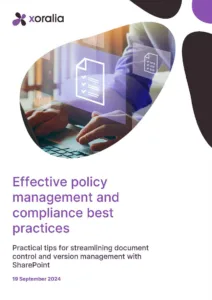Why compliance is critical and how to avoid compliance failure
- Dan Hawtrey

Compliance is critical for protecting an organization from legal and financial risks, maintaining its reputation, and ensuring smooth operations. To avoid compliance failure, organizations must implement robust policies and procedures, provide regular training, and utilize compliance management tools. These tools help monitor regulatory changes, track compliance status, and facilitate timely updates to policies and procedures. A proactive approach to compliance not only safeguards the organization but also fosters trust among stakeholders.
In this comprehensive guide we’re going to explore why compliance is so important and the areas that organisations need to think about in order to avoid compliance failure. We will look at what compliance is, the different reasons its important and the key areas that compliance relates. We also explore the industry sectors where compliance is a particular priority. We then go on to cover the reasons for compliance failure and the consequences of a failure to comply. Finally, we look the role that policy management can play and how software like Xoralia can reduce compliance-related risks.
What is compliance?
At a fundamental level compliance can be defined as the act of complying with a particular command or request. In terms of corporate life, compliance can be defined as the measures and practices put in place to make sure that specific legal and regulatory requirements and commitments are met and strictly adhered to. Compliance can also relate to internal policies, procedures and rules that are imposed within an organisation to reduce risk, maximise efficiency and support operations. Inevitably some internal compliance measures will be linked to external regulations too.
From an organisational point of view, compliance often involves demonstrating that you are doing everything possible to ensure compliance, for example designing processes and communicating with employees. There may well be related reporting around this, both internally and to external third parties such as regulators.
Why is compliance so important?
Compliance-related activities are not necessarily the most interesting or enjoyable elements of the working day, but they are important. While sometimes it can feel like compliance involves a lot of red tape and paperwork, and sometimes there can be more bureaucracy involved than is needed, fundamentally compliance is there for good reasons. Even if you feel some areas of compliance are unnecessary, the fact is that the relative policies, procedures and rules will need to be followed.
Let’s explore some of the reasons why compliance is so important.
It’s the law
- Some compliance is based around following the law, protecting organisations and citizens, and wider society. Breaking the law is not an option, and compliance helps to reduce the risk of legal action being taken against your organisation and the individuals within it.
Reducing risk
- It’s inevitable that things will go wrong in organisations. There are problems and issues that need to be overcome, with incidents and examples of fraud, accidents, and data breaches. But compliance significantly reduces the risk of things going wrong and the frequency of incidents. It also reduces the severity of the consequences when something does occur, such as reputational damage caused to a brand.
Protect customers
- Compliance impacts various areas including the delivery of products and services to customers. External regulations and internal compliance are often there to ensure that consumers are protected and a business carries out its duty of care to it customers. Compliance can also relate to protecting suppliers.
Protect employees
- Compliance also protects employees so that employment law is adhered to, that the workforce operates in a level playing field, that their working environment is safe, and more. It helps to create professional standards that influence the interaction between employees. Overall, compliance ensures organisations carry out their duty of care to their employees.
- Compliance also ensures that employees don’t inadvertently break the law and reduces the chance of them being liable for something that goes wrong which could result in legal or disciplinary action.
Maintains standards and competition in particular sectors
- Many sectors have specific regulations that must be adhered to that ensure certain standards are met, while also helping to support competition that is ultimately beneficial to customers.
Ensure safety
- A safe working environment is critical, particularly in sectors where there is a chance of accidents. Compliance supports health and safety, for example in manufacturing, construction and utilities.
Establishes privacy
- Privacy is becoming increasingly important as everything we do becomes more digital. Compliance protects the data and privacy of employees and customers.
Drive efficiency and productivity
- Compliance with internally produced policies and procedures is also often about driving efficiency and raising productivity, an important area that ultimately hits the bottom line.
Supports certification
- Some organisations need to establish certification around various different standards, ranging from security to safety to quality. These are externally audited. Compliance supports certification.
Supports ethical approaches
- Most organisations and employees want to do the right thing. Taking ethical approaches is also very important for an organisation’s brand and reputation. Compliance helps employees and organisations to make the right decisions.
What are some of the key areas where compliance matters?
Compliance matters across a whole variety of areas. The specifics and emphasis placed on each will depend very much on the industry sector an organisation operates in, the related country and region and, to a certain extent, the appetite for risk that the organisation has.

Core business activities
- Often there may be regulations relating to the core business activities of an organisation either due to a professional body that covers a particular sector, or due to legislation. For example, gaming companies have restrictions on what they can and cannot offer to customers. Restaurants must follow strict environmental standards and so on.
Finance and accounting
- Finance and accounting are areas where it is critical to follow the right processes around reporting, recording and declaring information. Compliance helps minimise the chance of fraud and provides reassurance to authorities, investors, employees and customers.
Health & safety
- Health & safety is an area where compliance is king and minimises accidents to protect employees, as well as reduce risks around reputational damage and legal action.
Data privacy and GDPR
- Data privacy is an area that has come sharply into focus in the last few years thanks to legislation such as the General Data Protection Register (GDPR) and the California Consumer Protection Act (CCPA). A number of high profiles data breaches has also ensured the protection of consumer and employee data is an area of concern for individuals.
Accessibility
- Accessibility related compliance relates both to the built environment and digital channels; this is an area where growing awareness has meant there has been more progress in recent years, but compliance is still patchy on the digital side.
Disclosure and reporting
- Depending on the industry and for certain types of organisations, there will be various areas which require certain disclosure and reporting requirements. Some of these are formal, but others will be more around demonstrating to regulators that action is being taken.
Cybersecurity
- Cybersecurity remains a significant problem for everyone. Compliance relating to cybersecurity matters is not necessarily required by regulators but is very important for certification such as ISO 270001. It will also be very important internally for organisations, and certain measures may also be demanded by key customers in B2B scenarios as well as by professional indemnity insurers.
HR and employment
- Employment law requires compliance around particular processes including recruitment, promotion, disciplinary procedures and terminating positions. This is a key area where managers in particular must follow due process.
Sales and marketing
- Sales and marketing processes will need to follow consumer laws, but in some sectors there are additional processes that must be followed, for example in financial services.
Environmental
- As the climate crisis starts to bite, environmental regulation and reporting will increasingly become important in the compliance landscape.
Which sectors is compliance particularly important?
Compliance is important for all organisations, but there is particular emphasis across some industry sectors or type of company. Here a failure of compliance can be a significant issue.

Sectors include:
- Construction and engineering: these sectors have strict regulations to follow around health and safety, as well as relating to the specific construction and engineering projects.
- Financial services: this sector is heavily regulated, for example with processes that must be followed to prevent the misselling of financial products and to reduce fraud.
- Healthcare: healthcare depends on strict compliance with everything relating to the provision of care, as well as the protection of patient data.
- Public sector and government: public sector organisations often have very strict processes around reporting and recording data, as well as other core activities such procurement and contracts.
- Utilities and mining: this is another sectors where health and safety is critical and where there are also strong environmental regulations that must be adhered to.
- Manufacturing: health & safety is important in manufacturing, not only the process but also to ensure that products are safe to use.
- Professional services: sectors such as accountancy and the legal industry are subject to sets of regulations including relating to professional practices, conflicts of interest and how services are marketed.
- Aviation and transport: there are regulations around safety, treatment of passengers and more.
- Gaming: gaming is a sector which is heavily regulated, particularly with measures that are designed to reduce gambling addiction.
- Listed companies: listed companies have many different rules relating to reporting and disclosure with different procedures in place to protect against fraudulent practices such as insider trading.
What are common reasons for compliance failure?
There are a number of common reasons for compliance failure. Of course, organisations can never complete eliminate the risk of not complying, but they can do a lot to mitigate the risks around it.
Lack of process
- Compliance requires having the right processes in place that align with compliance commitments. Where there is a lack of formal or clear process, there is a risk of not following the right process steps of rules. A badly designed process can also create risks.
Lack of monitoring and controls
- Important areas of compliance need much more than a fingers-crossed approach to hope that everything is being followed. Organisations will need to have the right monitoring tools and controls to support compliance.
Lack of training and awareness
- Most compliance relies on the right actions, decision-making and even goodwill of employees. Where there is not the right level of training and awareness, there is a chance that employees will not follow the right steps, increasing the risk of non-compliance.
Lack of a compliance culture
- Some organisations have a strong compliance culture and a low appetite for risk, particularly in sectors such as energy and financial services. In some organisations – or in particular teams within that organisation – there may be a higher appetite for risk where corners are cut and sometimes a blind eye is turned to non-compliance.
Leaders don’t set an example
- In organisations where there is a lack of a compliance culture, it may be that leaders and senior managers don’t set an example, increasing the risk of behaviours that can lead to non-compliance, or a lack of maturity relating to monitoring and reporting.
Lack of ability to report to third parties
- Sometimes compliance is down to demonstrating to third parties that approaches to supporting compliance are in place, such as employees completing annual training. Not having the right reporting software in place can undermine the ability to demonstrate successful compliance.
What are the consequences of non-compliance?
There are a variety of different consequences associated with a failure to comply. There range from relatively mild to extremely serious.

Fines and worse
- The consequences of an organisation found to have failed to company to regulations can result in a significant fine for a company that can stretch to millions of dollars, pounds or euros. Even if this is covered by an organisation’s indemnity insurance, it will mean premiums will rise. The consequences can even stretch beyond financial penalties with the potential for executives to be banned from practice or even jailed, if there is evidence of criminal activity.
Legal action
- A failure of compliance can result in legal action. Whether this is successful or unsuccessful it will result in having to pay out legal fees, not all of which may be recovered. Sometimes organisations choose to settle out of court. Again, even if this is covered by insurance, it can mean premiums have the potential to rise.
Business disruption
- One aspect of ongoing legal action or an investigation that is not often stated, is the significant business disruption it can cause. Senior leaders and internal teams may have to spend significant time and energy on focusing on it, while still having to manage “business as usual”. It can also be stressful and an ongoing distraction that can disrupt plans.
- Processes may also have to be redesigned to avoid it happening again. It’s a disruption to operations and growth that nobody wants.
Suspension of activities
- In rare occasions an organisation might have to suspend its activities due to a serious failure to comply, either because this is demanded by a regulator or authority, or because it is deemed necessary to make an urgent change to operations.
Reputational damage
- A failure of compliance can cause significant reputational damage both with consumers but also internally with your employees. Data breaches, high profile accidents and financial misconduct all can damage confidence in your brand, and the record is permanently there on the internet. When there is an ongoing investigation or legal action it will also continue to appear in the news and cause damage.
The importance of policy management in compliance
Of course, there are huge amounts that need to be done to avoid compliance issues in some organisations, from introducing corporate governance procedures to redesigning processes to fundamentally shifting organisational culture. However, there are also more operational and tactical changes that can make a real difference, including introducing taking a more robust approach to policy management.
Having the right policies and procedures in place and making sure that employee can easily access and find these is a foundation for compliance. This ensures:
- Employees are aware of the policies and procedures they need to follow.
- There is clarity over the finer detail of the procedural steps and guidelines that must be adhered to.
- There are no misunderstandings about what is mandatory for compliance and what isn’t.
- External regulators can see that policies are being effectively managed, and an organisation is doing what it can to support compliance.
- Organisations are protected in case they need to take action against employees who deliberately choose not to follow compliance-related rules.
- Employees are protected in case organisations try to unfairly blame them for a failure to comply.
The role of policy management software to prevent compliance failure
However, sometimes policy management is easier said then done. Despite the best intentions to introduce robust policy management to prevent a failure to comply, in practice organisations trip up because:
- Employees simply can’t find the policies they need, and therefore might not even be aware there are rules they need to follow.
- Policies are not adhered to due to a lack of easy access.
- There are multiple versions of policies in circulation causing confusion and employees not sure about which to follow, or even following the wrong policy or procedure.
- It becomes very difficult to let employees know about a change to a policy.
- It is impossible to report on effective policy management or the successful dissemination of policies to third-party regulators or certification bodies.
All of the above can result in an increased risk of compliance failure.
However, policy management software can do some of the heavy lifting around policy management and help to avoid many of the issues mentioned above. A policy management solution like Xoralia does this by
- Creating a central policy library that everyone can access, and where everybody can find the policies they need.
- Ensuring there is one source of truth with strict version control to eliminate duplication of policies circulating.
- Enabling policy management lifecycle features such as review reminders to support policy owners in keeping polices up to date.
- Including employee attestation and even e-learning features so that employees confirm they have read and understood a policy, and are tested to ensure that knowledge is embedded.
- Using personalisation and targeting to ensure employees find and view the policies that are relevant to them, but also are aware when there are updates.
- Enabling compliance reporting to help internal policy management but also to show to external parties to confirm compliance efforts.
It’s critical to minimise the risk of a failure of compliance
Compliance is king, particularly in regulated sectors and a failure to comply can be very serious. There are various measures and tactics that organisations can carry out to minimise risks around compliance failure, including introducing better policy management. If you’d like to see if Xoralia could help reduce risks in your organisation, then why not book a free demo?
The story behind Xoralia
 Xoralia was built by the team at Content Formula, an intranet and digital workplace consultancy that has built SharePoint intranets for some of the world’s most famous companies. Now, most companies want their policies and procedures on the intranet but they don’t just want to store them there, they also want tools to help better manage them. Over the years we came across just about every single requirement for a policy management system. As this article above explains, there are gaps in SharePoint and so we never built what in our mind was the perfect policy management system.
Xoralia was built by the team at Content Formula, an intranet and digital workplace consultancy that has built SharePoint intranets for some of the world’s most famous companies. Now, most companies want their policies and procedures on the intranet but they don’t just want to store them there, they also want tools to help better manage them. Over the years we came across just about every single requirement for a policy management system. As this article above explains, there are gaps in SharePoint and so we never built what in our mind was the perfect policy management system.
However, one of our clients challenged us to build something for them that filled all the gaps but still used SharePoint at the back end. We had a great relationship with them and agreed to share the budget to do this, provided we could then market the solution to others. That was in 2019. We’re now on version 3 of Xoralia and the product has grown and evolved a lot.
3 benefits you can expect from Xoralia
Make it easy to find policies
Centralised policy library with powerful search and filtering.
Reduce administrative burden
Automations and notifications so that all policy tasks are carried out on time
Demonstrate compliance and best practice
Sophisticated tracking and dashboards to drive and measure compliance.
And lots more!
What our clients say

AppSource review
A great time saver and tool for document management

Tim Galer
IT Coordinator
Hughes
Ideal partner for our regulated environment

Adam Lythgoe
IT Manager
LifeArc
How to get started with Xoralia
Step 1: request a demo
Fill out our form and we will be in touch to arrange a time. You can even book a time yourself.
Step 2: get a price proposal
If you think Xoralia is for you ask us for a quote. This will set out any options you may have.
Step 3: install and launch
We’ll install Xoralia in your environment (or you can do it yourself). We’ll provide training and support to get you up and running quickly.
Here's what you'll get
-
Central policy library
-
Search and filter tools
-
Mandatory read policies with attestations
-
Quizzes
-
Notifications and alerts
-
Employee dashboard
-
Line manager dashboard
-
Works on mobile, in Teams and SharePoint
-
New policy creation workflows
-
Policy update workflows
-
Review and approval gates
-
Policy version history
-
Compliance dashboard
-
Audit trail
-
Full reporting
And last but not least:
-
Professional implementation service and support
-
Evergreen software – frequent updates and improvements
-
Comes with our "it just works" support warranty – we’ll fix any bugs, often before you even notice
Ready to get started?
Connect with us to streamline your policy management and ensure effortless compliance.

AppSource review
Uniting excellence in integration and features for seamless policy management

Rian Stuart
IT Manager
TwinStream
